- Home
- H. P. Lovecraft
The Watchers Out of Time Page 17
The Watchers Out of Time Read online
Page 17
“Zadok Allen swears he saw Sarah swimming out to Devil Reef. Marshes carrying her along. All naked. Swears he saw Marshes with tough, warty skin. Some with scales, like fish! Swears he saw them chase and eat fish! Tear them apart like animals.”
The next entry was again a portion of a letter, patently a reply to one from Grandfather Whateley.
“You ask who is responsible for those ridiculous tales about the Marshes. Well, Luther, it would be impossible to single out any one or a dozen people over several generations. I agree that old Zadok Allen talks too much, drinks, and may be romancing. But he is only one. The fact is this legendry—or rigmarole, as you call it,—has grown up from one generation to the next. Through three generations. You have only to look at some of the descendants of Captain Obed to understand why this could have come about. There are some Marsh offspring said to have been too horrible to look upon. Old wives’ tales? Well, Dr. Rowley Marsh was too ill to attend one of the Marsh women one time; so they had to call Dr. Gilman, and Gilman always said that what he delivered was less than human. And nobody ever saw that particular Marsh, though there were people later who claimed to have seen things moving on two legs that weren’t human.”
Following this there was but a brief but revealing entry in two words: “Punished Sarah.”
This must then mark the date of Sarah Whateley’s confinement to the room above the mill. For some time after this entry, there was no mention of his daughter in Luther’s script. Instead, his jottings were not dated in any way, and, judging by the difference in the color of the ink, were made at different times, though run together.
“Many frogs. Seem to bear in on the mill. Seem to be more than in the marshes across the Miskatonic. Sleeping difficult. Are whippoorwills on the increase, too, or is this imagination?…Counted thirty-seven frogs at the porch steps tonight.”
There were more entries of this nature. Abner read them all, but there was no clue in them to what the old man had been getting at. Luther Whateley had thereafter kept book on frogs, fog, fish and their movements in the Miskatonic—when they rose and leaped from the water, and so on. This seemed to be unrelated data, and was not in any way connected to the problem of Sarah.
There was another hiatus after this series of notes, and then came a single, underscored entry.
“Ariah was right!”
But about what had Ariah been right? Abner wondered. And how had Luther Whateley learned that Ariah had been right? There was no evidence that Ariah and Luther had continued their correspondence, or even that Ariah desired to write to the crochety Luther without a letter of direct inquiry from Luther.
There followed a section of the record to which newspaper clippings had been pasted. These were clearly unrelated, but they did establish for Abner the fact that somewhat better than a year had passed before Luther’s next entry, one of the most puzzling Abner found. Indeed, the time hiatus seemed to be closer to two years.
“R. out again.”
If Luther and Sarah were the only people in the house, who was “R.”? Could it have been Ralsa Marsh come to visit? Abner doubted it, for there was nothing to show that Ralsa Marsh harbored any affection for his distant cousin, or certainly he would have pursued her before this.
The next notation seemed to be unrelated.
“Two turtles, one dog, remains of woodchuck. Bishop’s—two cows, found on the Miskatonic end of the pasture.”
A little further along, Luther had set down further such data.
“After one month a total of 17 cattle, 6 sheep. Hideous alterations; size commensurate with amt. of food. Z. over. Anxious about talk going around.”
Could Z. stand for Zebulon? Abner thought it did. Evidently then Zebulon had come in vain, for he had left him, Abner, with only vague and uncertain hints about the situation at the house when Aunt Sarey was confined to the shuttered room. Zebulon, on the evidence of such conversation as he had shared with Abner, knew less than Abner himself did after reading his grandfather’s record. But he did know of Luther’s record; so Luther must have told him he had set down certain facts.
These notations, however, were more in the nature of notes for something to be completed later; they were unaccountably cryptic, unless one had the key of basic knowledge which belonged to Luther Whateley. But a growing sense of urgency was clearly manifest in the old man’s further entries.
“Ada Wilkerson gone. Trace of scuffle. Strong feeling in Dunwich. John Sawyer shook his fist at me—safely across the street, where I couldn’t reach him.”
“Monday. Howard Willie this time. They found one shoe, with the foot still in it!”
The record was now near its end. Many pages, unfortunately, had been detached from it—some with violence—but no clue remained as to why this violence had been done to Grandfather Whateley’s account. It could not have been done by anyone but Luther himself; perhaps, thought Abner, Luther felt he had told too much, and intended to destroy anything which might put a later reader on the track of the true facts regarding Aunt Sarey’s confinement for the rest of her life. He had certainly succeeded.
The next entry once again referred to the elusive “R.”
“R. back at last.”
Then, “Nailed the shutters to the windows of Sarah’s room.”
And at last: “Once he has lost weight, he must be kept on a careful diet and to a controllable size.”
In a way, this was the most enigmatic entry of them all. Was “he” also “R.”? If so, why must he be kept on a careful diet, and what did Luther Whateley mean by controlling his size? There was no ready answer to these questions in such material as Abner had read thus far, either in this record—or the fragmentary account still left in the record—or in letters previously perused.
He pushed away the record-book, resisting an impulse to burn it. He was exasperated, all the more so because he was uneasily aware of an urgent need to learn the secret embalmed within this old building.
The hour was now late; darkness had fallen some time ago, and the ever-present clamor of the frogs and the whippoorwills had begun once more, rising all around the house. Pushing from his thoughts briefly the apparently unconnected jottings he had been reading, he called from his memory the superstitions of the family, representing those prevalent in the countryside—associating frogs and the calling of whippoorwills and owls with death, and from this meditation progressed readily to the amphibian link which presented itself—the presence of the frogs brought before his mind’s eye a grotesque caricature of one of the Marsh clan of Innsmouth, as described in the letters Luther Whateley had saved for so many years.
Oddly, this very thought, for all that it was so casual, startled him. The insistence of frogs and toads on singing and calling in the vicinity was truly remarkable. Yet, batrachia had always been plentiful in the Dunwich vicinity, and he had no way of knowing for how long a period before his arrival they had been calling about the old Whateley house. He discounted the suggestion that his arrival had anything at all to do with it; more than likely, the proximity of the Miskatonic and a low, swampy area immediately across the river on the edge of Dunwich, accounted for the presence of so many frogs.
His exasperation faded away; his concern about the frogs did likewise. He was weary. He got up and put the record left by Luther Whateley carefully into one of his bags, intending to carry it away with him, and to puzzle over it until some sort of meaning came out of it. Somewhere there must exist a clue. If certain horrible events had taken place in the vicinity, something more in the way of a record must exist than Luther Whateley’s spare notes. It would do no good to inquire of Dunwich people; Abner knew they would maintain a close-mouthed silence before an “outsider” like himself, for all that he was related to many of them.
It was then that he thought of the stacks of newspapers, still set aside to be burned. Despite his weariness, he began to go through packs of the Aylesbury Transcript, which carried, from time to time, a Dunwich department.
After an hou
r’s hasty search, he found three vague articles, none of them in the regular Dunwich columns, which corroborated entries in Luther Whateley’s ledger. The first appeared under the heading: Wild Animal Slays Stock Near Dunwich—
“Several cows and sheep have been slain on farms just outside Dunwich by what appears to be a wild animal of some kind. Traces left at the scenes of the slaughter suggest some large beast, but Professor Bethnall of Miskatonic University’s anthropology department points out that it is not inconceivable that packs of wolves could lurk in the wild hilly country around Dunwich. No beast of the size suggested by the traces reported was ever known to inhabit the eastern seaboard within the memory of man. County officials are investigating.”
Search as he might, Abner could find no follow-up story. He did, however, come upon the story of Ada Wilkerson.
“A widow-lady, Ada Wilkerson, 57, living along the Miskatonic out of Dunwich, may have been the victim of foul play three nights ago. When she failed to visit a friend by appointment in Dunwich, her home was visited. No trace of her was found. However, the door of her house had been broken in, and the furniture had been wildly thrown about, as if a violent struggle had taken place. A very strong musk is said to have pervaded the entire area. Up to press time today, Mrs. Wilkerson has not been heard from.”
Two subsequent paragraphs reported briefly that authorities had not found any clue to Mrs. Wilkerson’s disappearance. The account of a “large animal” was resurrected, lamely, and Professor Bethnall’s beliefs on the possible existence of a wolf-pack, but nothing further, for investigation had disclosed that the missing lady had neither money nor enemies, and no one would have had any motive for killing her.
Finally, there was the account of Howard Willie’s death, headed, Shocking Crime at Dunwich.
“Some time during the night of the twenty-first Howard Willie, 37, a native of Dunwich, was brutally slain as he was on his way home from a fishing trip along the upper reaches of the Miskatonic. Mr. Willie was attacked about half a mile past the Luther Whateley property, as he walked through an arbored lane. He evidently put up a fierce fight, for the ground is badly torn up in all directions. The poor fellow was overcome, and must have been literally torn limb from limb, for the only physical remains of the victim consisted of his right foot, still encased in its shoe. It had evidently been cruelly torn from his leg by great force.
“Our correspondent in Dunwich advises us that people there are very sullen and in a great rage of anger and fear. They suspect many of their number of being at least partly to blame, though they stoutly deny that anyone in Dunwich murdered either Willie or Mrs. Wilkerson, who disappeared a fortnight ago, and of whom no word has since been heard.”
The account concluded with some data about Willie’s family connections. Thereafter, subsequent editions of the Transcript were distinguished only for the lack of information about the events which had taken place in Dunwich, where authorities and reporters alike apparently ran up against blank walls in the stolid refusal of the natives to talk or even speculate about what had happened. There was, however, one insistent note which recurred in the comments of investigators, relayed to the press, and that was that such trail or track as could be seen appeared to have disappeared into the waters of the Miskatonic, suggesting that if an animal were responsible for the orgy of slaughter which had occurred at Dunwich, it may have come from and returned to the river.
Though it was now close to midnight, Abner massed the discarded newspapers together and took them out to the riverbank, where he set them on fire, having saved only torn pages relative to the occurrences at Dunwich. The air being still, he did not feel obliged to watch the fire since he had already burned a considerable area, and the grass was not likely to catch on fire. As he started away, he heard suddenly above the ululation of the whippoorwills and frogs, now at a frenzied crescendo, the tearing and breaking sound of wood. He thought at once of the window of the shuttered room, and retraced his steps.
In the very dim light flickering toward the house from the burning newspapers, it seemed to Abner that the window gaped wider than before. Could it be that the entire mill part of the house was about to collapse?
Then, out of the corner of his eye, he caught sight of a singularly formless moving shadow just beyond the mill wheel, and a moment later heard a churning sound in the water. The voices of the frogs had now risen to such a volume that he could hear nothing more.
He was inclined to dismiss the shadow as the creation of the wild flames leaping upward from the fire. The sound in the water might well have been that of the movement made by a school of fish, darting forward in concert. Nevertheless, he thought, it would do no harm to have another look at Aunt Sarey’s room.
He returned to the kitchen, took the lamp, and mounted the stairs. He unlocked the door of the shuttered room, threw open the door, and was almost felled by the powerful musk which pushed hallward. The smell of the Miskatonic, of the marshes, the odor of that slimey deposit left on the stones and sunken debris when the Miskatonic receded to its low water stage, the cloying pungence of some animal lairs—all these were combined in the shuttered room.
Abner stood for a moment, wavering on the threshold. True, the odor in the room could have come in through the open window. He raised the lamp so that more of its light fell upon the wall above the mill wheel. Even from where he stood, it was possible to see that not only was all the window itself now gone, but so was the frame. Even at this distance it was manifest that the frame had been broken out from inside!
He fell back, slammed the door shut, locked it, and fled down stairs with the shell of his rationalizations tumbling about him.
V
Downstairs, he fought for self-control. What he had seen was but one more detail added to the proliferating accumulation of seemingly unrelated data upon which he had stumbled ever since his coming to his grandfather’s home. He was convinced now that however unlikely it had at first seemed to him, all these data must be related. What he needed to learn was the one basic fact or element which bound them together.
He was badly shaken, particularly because he had the uneasy conviction that he did indeed have all the facts he needed to know, that it was his scientific training which made it impossible for him to make the primary assumption, to state the premise which the facts before him would inevitably prove. The evidence of his senses told him that something laired in that room—some bestial creature; it was folly to assume that odors from outside could so permeate Aunt Sarey’s old room and not be noticeable outside the kitchen and at the windows of his own bedroom.
The habit of rational thinking was strong in him. He took out Luther Whateley’s final letter to him once more and read it again. That was what his grandfather had meant when he had written “you have gone forth into the world and gathered to yourself learning sufficient to permit you to look upon all things with an inquiring mind ridden neither by the superstition of ignorance nor the superstition of science.” Was this puzzle, with all its horrible connotations, beyond rationalization?
The wild ringing of the telephone broke in upon his confused thoughts. Slipping the letter back into his pocket, he strode rapidly to the wall and took the receiver off the hook.
A man’s voice screamed over the wire, amid a chaos of inquiring voices as everyone on the line picked up his receiver as if they waited, like Abner Whateley himself, for word of another tragedy. One of the voices—all were disembodied and unidentifiable for Abner—identified the caller.
“It’s Luke Lang!”
“Git a posse up an’ come quick,” Luke shouted hoarsely over the wire. “It’s jest aoutside my door. Snufflin’ araoun’. Tryin’ the door. Feelin’ at the winders.”
“Luke, what is it?” asked a woman’s voice.
“Oh, Gawd! It’s some unairthly thing. It’s a-hoppin’ raoun’ like it was too big to move right—like jelly. Oh, hurry, hurry, afore it’s too late. It got my dog….”
“Git off the wire so’s we
can call fer help,” interrupted another subscriber.
But Luke never heard in his extremity. “It’s a-pushin’ at the door—it’s a-bowin’ the door in….”
“Luke! Luke! Git off’n the wire!”
“It’s a-tryin’ the winder naow.” Luke Lang’s voice rose in a scream of terror. “There goes the glass. Gawd! Gawd! Hain’t yew comin’? Oh, that hand! That turri’ble arm! Gawd! That face…!”
Luke’s voice died away in a frightful screech. There was the sound of breaking glass and rending wood—then all was still at Luke Lang’s, and for a moment all was still along the wire. Then the voices burst forth again in a fury of excitement and fear.
“Git help!”
“We’ll meet at Bishops’ place.”
And someone put in, “It’s Abner Whateley done it!”
Sick with shock and half-paralyzed with a growing awareness, Abner struggled to tear the receiver from his ear, to shut off the half-crazed bedlam on the party line. He managed it with an effort. Confused, upset, frightened himself, he stood for a moment with his head leaning against the wall. His thoughts seethed around but one central point—the fact that the Dunwich rustics considered him somehow responsible for what was happening. And their conviction, he knew intuitively, was based on more than the countryman’s conventional distrust of the stranger.
He did not want to think of what happened to Luke Lang—and to those others. Luke’s frightened, agonized voice still rang in his ears. He pulled himself away from the wall, almost stumbling over one of the kitchen chairs. He stood for a moment beside the table, not knowing what to do, but as his mind cleared a little, he thought only of escape. Yet he was caught between the desire to get away, and the obligation to Luther Whateley he had not yet fulfilled.
But he had come, he had gone through the old man’s things—all save the books—he had made arrangements to tear down the mill part of the house—he could manage its sale through some agency; there was no need for him to be present. Impulsively, he hastened to the bedroom, threw such things as he had unpacked, together with Luther Whateley’s note-filled ledger, into his bags, and carried them out to his car.

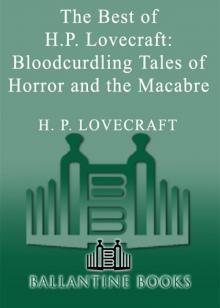 The Best of H.P. Lovecraft
The Best of H.P. Lovecraft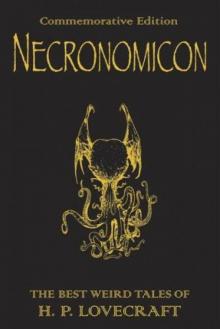 The Definitive H.P. Lovecraft: 67 Tales Of Horror In One Volume
The Definitive H.P. Lovecraft: 67 Tales Of Horror In One Volume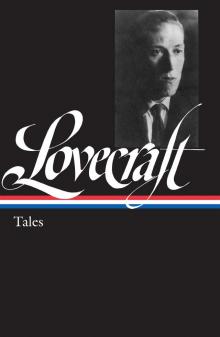 The Complete Works of H.P. Lovecraft
The Complete Works of H.P. Lovecraft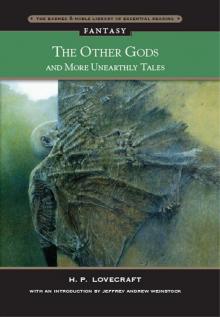 Other Gods and More Unearthly Tales
Other Gods and More Unearthly Tales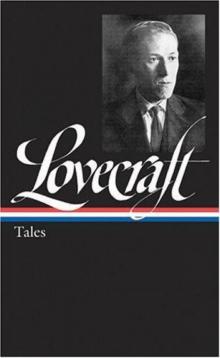 Lovecraft's Fiction Volume I, 1905-1925
Lovecraft's Fiction Volume I, 1905-1925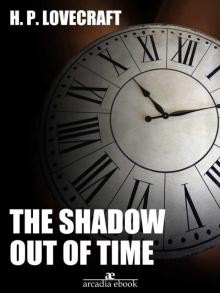 The Shadow Out of Time
The Shadow Out of Time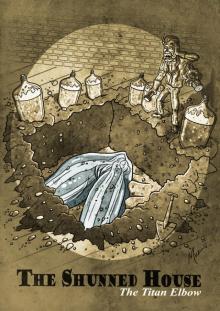 The Shunned House
The Shunned House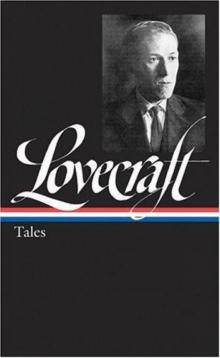 Lovecraft's Fiction Volume II, 1926-1928
Lovecraft's Fiction Volume II, 1926-1928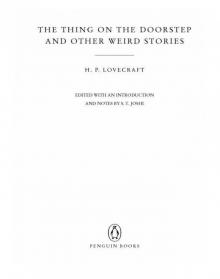 The Thing on the Doorstep and Other Weird Stories
The Thing on the Doorstep and Other Weird Stories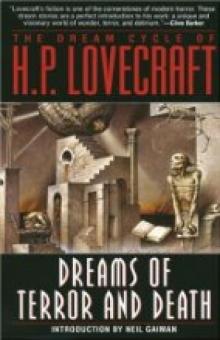 Dream Cycle of H. P. Lovecraft: Dreams of Terror and Death
Dream Cycle of H. P. Lovecraft: Dreams of Terror and Death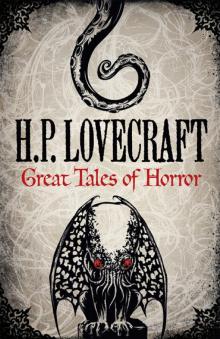 Great Tales of Horror
Great Tales of Horror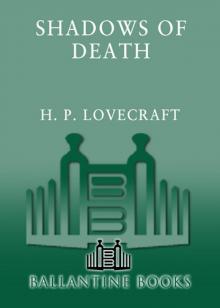 Shadows of Death
Shadows of Death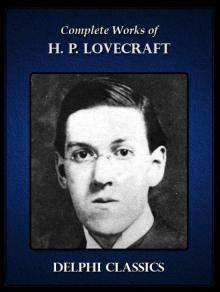 Delphi Complete Works of H. P. Lovecraft (Illustrated)
Delphi Complete Works of H. P. Lovecraft (Illustrated)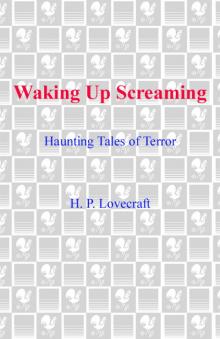 Waking Up Screaming: Haunting Tales of Terror
Waking Up Screaming: Haunting Tales of Terror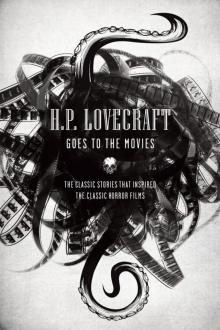 H.P. Lovecraft Goes to the Movies
H.P. Lovecraft Goes to the Movies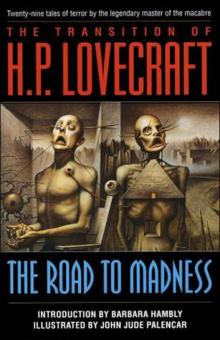 The Road to Madness
The Road to Madness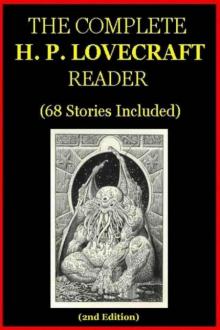 The Complete H.P. Lovecraft Reader (68 Stories)
The Complete H.P. Lovecraft Reader (68 Stories)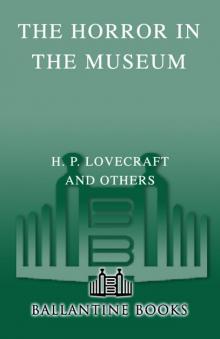 The Horror in the Museum
The Horror in the Museum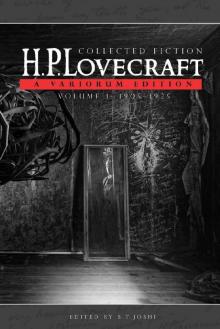 Collected Fiction Volume 1 (1905-1925): A Variorum Edition
Collected Fiction Volume 1 (1905-1925): A Variorum Edition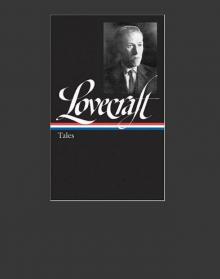 Lovecrafts_Fiction, vol.I_1905-1925
Lovecrafts_Fiction, vol.I_1905-1925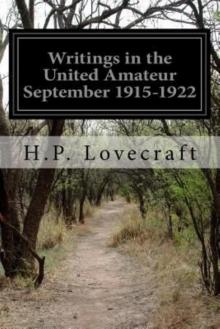 Writings in the United Amateur, 1915-1922
Writings in the United Amateur, 1915-1922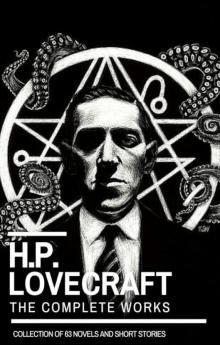 H.P. Lovecraft: The Complete Works
H.P. Lovecraft: The Complete Works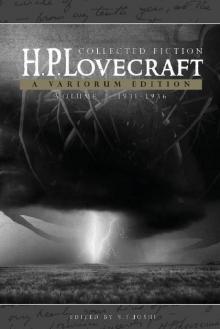 Collected Fiction Volume 3 (1931-1936): A Variorum Edition
Collected Fiction Volume 3 (1931-1936): A Variorum Edition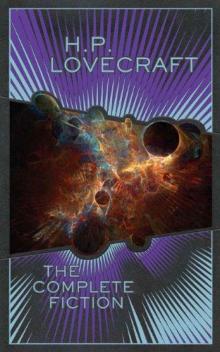 H.P. Lovecraft: The Complete Fiction
H.P. Lovecraft: The Complete Fiction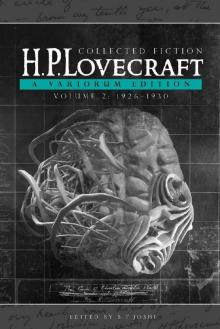 Collected Fiction Volume 2 (1926-1930): A Variorum Edition
Collected Fiction Volume 2 (1926-1930): A Variorum Edition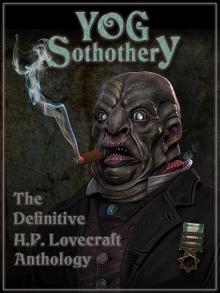 Yog Sothothery - The Definitive H.P. Lovecraft Anthology
Yog Sothothery - The Definitive H.P. Lovecraft Anthology The Complete H.P. Lovecraft Collection (Xist Classics)
The Complete H.P. Lovecraft Collection (Xist Classics)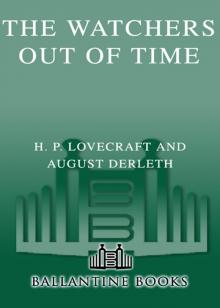 The Watchers Out of Time
The Watchers Out of Time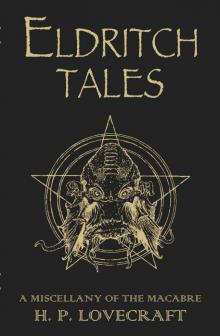 Eldritch Tales
Eldritch Tales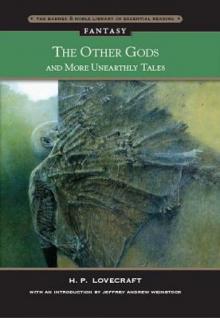 The Other Gods And More Unearthly Tales
The Other Gods And More Unearthly Tales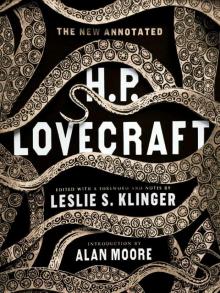 The New Annotated H. P. Lovecraft
The New Annotated H. P. Lovecraft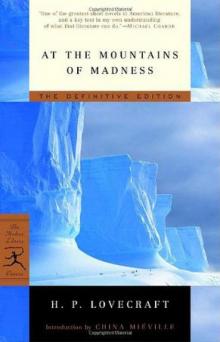 At the mountains of madness
At the mountains of madness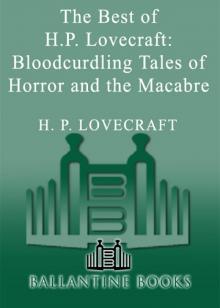 Bloodcurdling Tales of Horror and the Macabre
Bloodcurdling Tales of Horror and the Macabre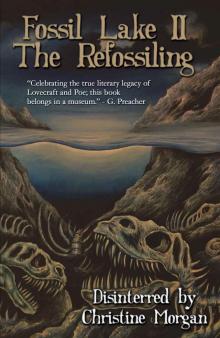 Fossil Lake II: The Refossiling
Fossil Lake II: The Refossiling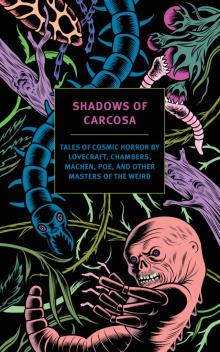 Shadows of Carcosa: Tales of Cosmic Horror by Lovecraft, Chambers, Machen, Poe, and Other Masters of the Weird
Shadows of Carcosa: Tales of Cosmic Horror by Lovecraft, Chambers, Machen, Poe, and Other Masters of the Weird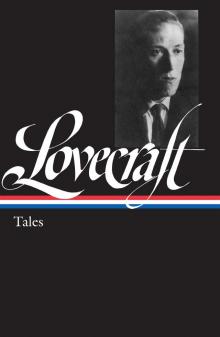 H. P. Lovecraft
H. P. Lovecraft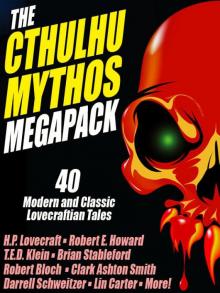 The Cthulhu Mythos Megapack
The Cthulhu Mythos Megapack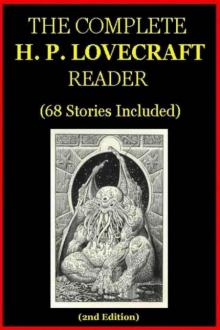 The Complete H. P. Lovecraft Reader (2nd Edition)
The Complete H. P. Lovecraft Reader (2nd Edition)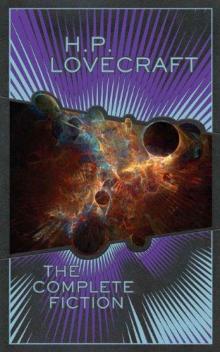 The Complete Fiction
The Complete Fiction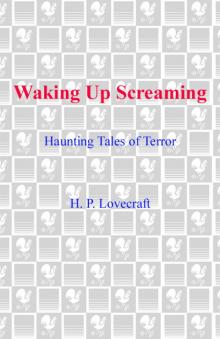 Waking Up Screaming
Waking Up Screaming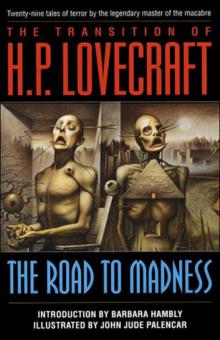 Transition of H. P. Lovecraft
Transition of H. P. Lovecraft![[1935] The Shadow Out of Time Read online](http://i1.bookreadfree.com/i2/04/12/1935_the_shadow_out_of_time_preview.jpg) [1935] The Shadow Out of Time
[1935] The Shadow Out of Time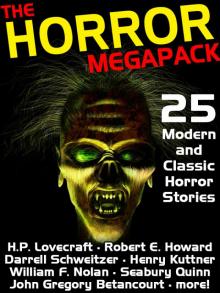 The Horror Megapack
The Horror Megapack